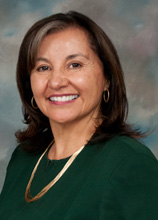Professor Sedillo Lopez Presents Paper at Fordham Conference
May 4, 2012

UNM Law Professor Antoinette Sedillo Lopez opened a conference at Fordham Law School with a presentation titled: "Transforming the Legal Profession: On the Other Side of Julius Cohen's Vision: Women and Minorities in the Legal Profession."
The title of the two-day April conference was, The Law: Business or Profession? The Continuing Relevance of Julius Henry Cohen for the Practice of Law in the Twenty-First Century. The conference brought together scholars in the areas of legal ethics and the legal profession, along with leaders of the practicing bar, in a wide-ranging discussion of the continuing relevance of Cohen's thought for the practice of law in the 21st century.
Cohen was an influential lawyer who played a substantial role in numerous matters of public interest in the first half of the 20th century. For example, Cohen assisted in the formation of the Port of New York Authority and served as its general counsel for more than 20 years. He served as a founding member of the American Arbitration Association; along with Louis Brandeis, he helped resolve the 1910 garment workers' strike in New York; and in opposition to Louis Marshall and much of the legal establishment, he defended the 1920 Emergency Rent Laws through the New York Court system up to the U.S. Supreme Court.
Yet, for scholars of legal ethics and the legal profession, Cohen's most significant legacy may be his landmark book, The Law: Business or Profession?, published in 1916. His book represented the first full-length consideration of the business/profession dichotomy, an issue that attracted considerable attention around the turn of the 20th century and has remained a perennial concern for legal scholars and practitioners alike.
In exploring the question posed in the book’s title, Cohen examined a number of areas of legal practice that, nearly 100 years later, remain central in the work of both ethics scholars and bar associations. Among other issues, he addressed standards of legal education, including evening law school programs; standards of admission to the bar, including discrimination on the basis of race or ethnicity; prohibitions on unauthorized practice of law; lay participation in legal practice; the structure and atmosphere of large corporate law firms; commercialization of legal practice; advertising for lawyers and the role of the lawyer in society.
Papers from the conference will be published in the Fordham Urban Law Journal.
